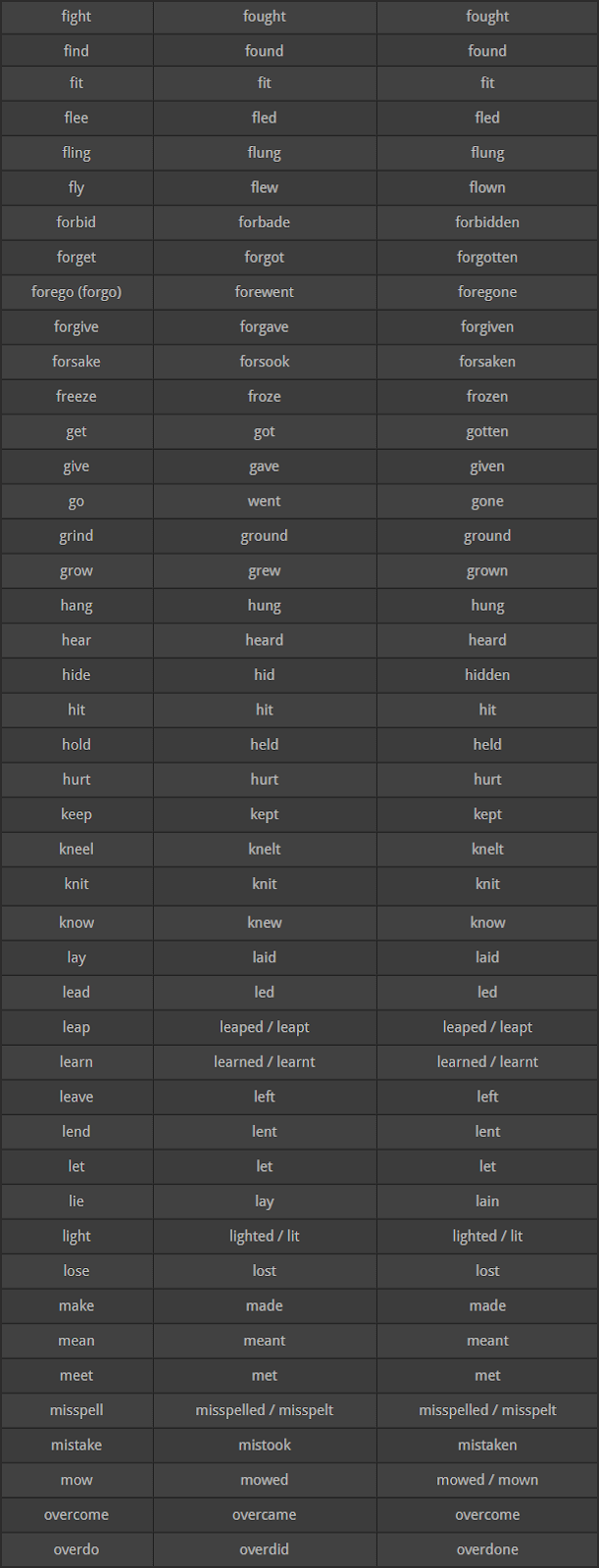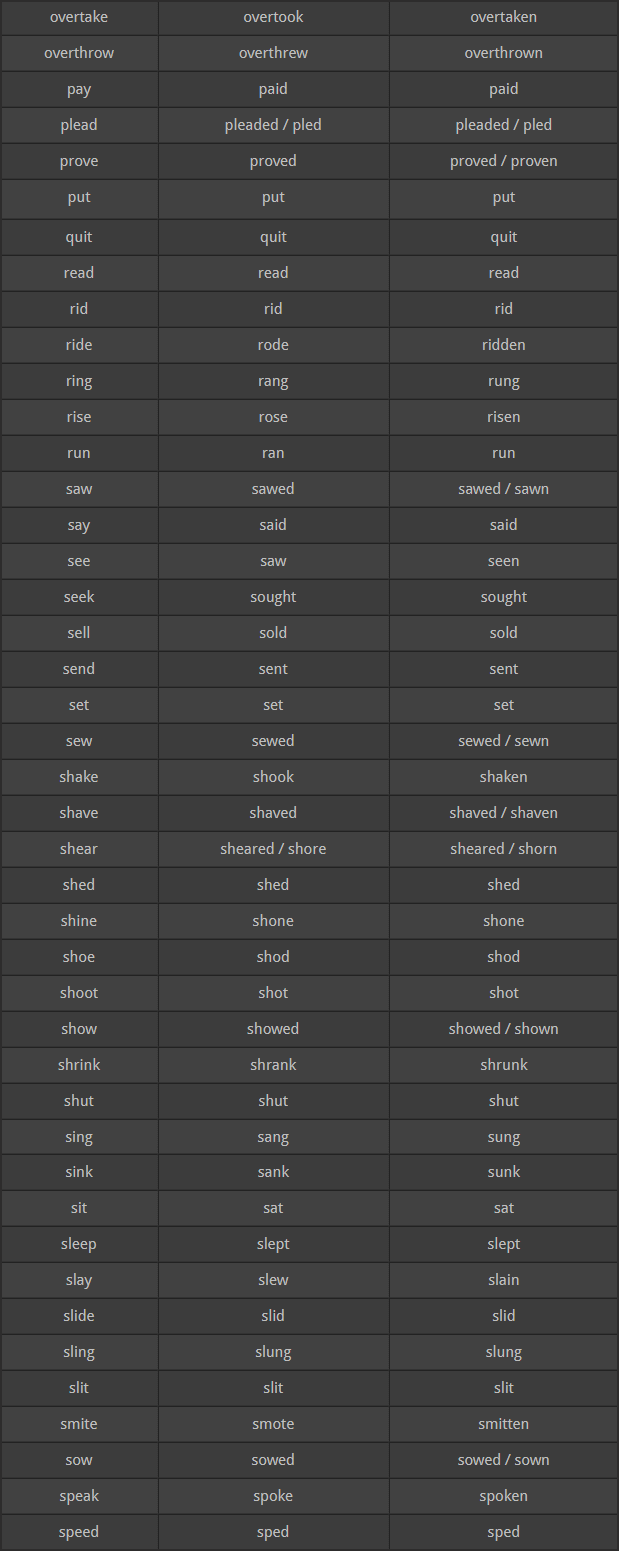Having a high score in the English grammar and correct usage part of the Civil Service Exam will greatly increase your chances in passing the test. To help you achieve that, I’ve compiled some very helpful tips regarding verbs. Knowing verbs, their forms ,and proper usage will broaden your vocabulary, not to mention help you pass the CSE. Take your time reading and understanding this part of the reviewer because it is definitely worth it.

Understanding Verbs, their Forms, and Usage
So what’s a verb? A verb is a word used to describe an action, state, or occurrence, and forming the main part of the predicate of a sentence. Aside from being an action word, verbs also have types. Read this entry about the basic types of verbs for an in-depth explanation.
Past Tense
When talking about the past, add “d” or “ed” to regular verbs. Works on all types of sentences perspectives as long as it is in the past tense.
Examples:
- John played tennis with his friends yesterday. (third-person)
- The workers received their first paycheck last night. (third-person)
- Have you tried this new recipe? (second-person)
- I thought you already washed the dishes? (second-person)
- I have fixed the broken pipe. (first-person)
- I cooked our family dinner last night. (first-person)
- We joined the cheer-leading squad. (first-person)
Present Tense
When talking about singular nouns, don’t forget to add “s” to it. Again, be sure to study the types of sentence perspectives so you can have an easier time with the proper use of verbs.
Examples:
- The basketball team plays every Saturday. (third-person sentence with a singular noun – basketball team)
- Nobody cares about my Facebook status. (third-person)
- Marina works during the night. (third-person)
- David delivers the mail every day. (third-person)
DO NOT add “s” when plural nouns are the subject of a sentence.
- We play every Saturday. ( first-person, plural pronoun)
- I care about your Facebook status. (first-person, singular pronoun) – Have a look at this Wikipedia entry about the pronoun “I”.
- You work during the night. (second-person) – Have a look at this Wikipedia entry about the pronoun “You”.
- They deliver the mail every day. (third-person, plural pronoun)
Future Tense
There are no inflected forms for the future in English (nothing like those -ed or -s endings in the other tenses). What you need to do instead is add the helping verbs will or shall with the base form of the verb.
- I will go on vacation next week.
- We shall win the game, that I promise.
- Maica will take a break after she is done with her homework.
The following table is an extensive list of irregular verbs. I know it’s a bit overwhelming but you have to familiarize yourself with these words in order to improve your chances of having a high rating in the Grammar and Correct Usage part of the CSE exam. It will also help you in answering the other parts of the test like Numerical Reasoning, Logic, Analogy, and Reading and Comprehension since they are all in English.
Irregular Verbs
Correct Usage of Verbs Sample Tests
These exercises will help you sharpen up your correct usage of verbs, which will be a great help when it comes to passing the Civil Service Exam. Try your best to get the most number of correct answers.
1. Do you think she ___ everything that I said?
- understanding b. understands c. understood d. understand
2. Liza ___ to learn French in Venice next year.
- hoped b. hopes c. hoping d. hope
3. I don’t think I’ve ever ___ in that chair.
- sat b. sit c. sitted d. sitting
4. Did you used to ___ with cars when you were young?
- play b. played c. playing d. plays
5. I have never ___ tempura before.
- ate b. eating c. eat d. eaten
6. The door was already ___ when Candy arrived.
- break b. broke c. broken d. breaks
7. Last night I ___ on the sofa and fell asleep.
- layed b. lie c. lay d. lied
8. Veronica ___ half of her time traveling around the world.
- spent b. spends c. spending d. spended
9. Your sister ___ for you for over an hour.
- waited b. waiting c. waits d. wait
10. It is not worth ___ so much money for this concert.
- paid b. pays c. pay d. paying
11. He usually ___ his homework in his room.
- did b. done c. does d. doing
12. Would you mind ___ the door, please? It’s dark in here.
- opened b. opening c. open d. opens
13. When I reached the station, the train had ___ already.
- leaving b. leaves c. left d. leave
14. I ___ the Leaning Tower of Pisa last month.
- visited b. visits c. visiting d. visit
15. The police ___ no stone unturned to trace the suspects.
- leaves b. leaving c. leave d. left
16. It must be ___ in mind that it is essential to be extremely honest in our dealings.
- borne b. bear c. bore d. beared
17. Before leaving for Canada, Mason ___ farewell to all his relatives.
- bode b. bade c. bidden d. bidding
18. Anita could not sleep because she is being constantly ___ by mosquitoes.
- biting b. bit c. bitten d. bits
19. When the local doctor could not treat Victor, he was immediately ___ to the nearest hospital.
- refers b. referring c. refer d. referred
20. Diana is the only woman who has ___ the cold river.
- swam b. swims c. swimming d. swim
Once you are done answering the questions, hit any of the buttons below to reveal the answers so you can check out the outcome of your test.
 Free CSE Reviewers Free Civil Service Exam Reviewer Online and Downloads
Free CSE Reviewers Free Civil Service Exam Reviewer Online and Downloads






